- Clone
- LNI-17 (See other available formats)
- Regulatory Status
- RUO
- Other Names
- PSM, Folate hydrolase 1 (FOLH1), Glutamate carboxypeptidase 2 (GCP2), NAALADase I, FGCP
- Isotype
- Mouse IgG1, κ
- Ave. Rating
- Submit a Review
- Product Citations
- publications
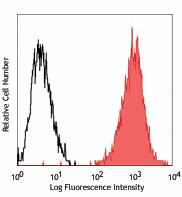
-

Human prostatic adenocarcinoma cell line LNCaP stained with purified LNI-17 conjugated to PE
| Cat # | Size | Price | Quantity Check Availability | Save | ||
|---|---|---|---|---|---|---|
| 342502 | 100 µg | 212€ | ||||
PSMA (prostate-specific membrane antigen) is a type II transmembrane zinc metallopeptidase, belonging to the M28 peptidase family. It possesses hydrolyzing enzyme activities and is also known as FOLH1 (folate hydrolase 1), GCP2 (glutamate carboxypeptidase II), and NAALADase I (N-acetylated-alpha-linked acidic dipeptidase I). PSMA is expressed by normal and malignant prostate epithelial cells, by urothelial adenocarcinoma, and vasculatures of other malignancies. It is also found in the nervous system.
Product DetailsProduct Details
- Verified Reactivity
- Human
- Antibody Type
- Monoclonal
- Host Species
- Mouse
- Formulation
- Phosphate-buffered solution, pH 7.2, containing 0.09% sodium azide.
- Preparation
- The antibody was purified by affinity chromatography.
- Concentration
- 0.5 mg/ml
- Storage & Handling
- The antibody solution should be stored undiluted between 2°C and 8°C.
- Application
-
FC - Quality tested
- Recommended Usage
-
Each lot of this antibody is quality control tested by immunofluorescent staining with flow cytometric analysis. For flow cytometric staining, the suggested use of this reagent is ≤0.5 µg per million cells in 100 µl volume. It is recommended that the reagent be titrated for optimal performance for each application.
- Product Citations
-
- RRID
-
AB_1626138 (BioLegend Cat. No. 342502)
Antigen Details
- Structure
- Type II transmembrane zinc metallopeptidase, M28 peptidase family
- Distribution
-
Epithelial cells in prostate, intestine and kidney tissue, nervous system
- Function
- Hydrolyzing enzyme activity
- Cell Type
- Epithelial cells
- Biology Area
- Cell Biology
- Antigen References
-
1. Silver DA, et al. 1997. Clin. Cancer Res. 3:81.
2. Troyer JK, et al. 1995. Int. J. Cancer. 62:552.
3. Mannweiler S, et al. 2009. Pathol. Oncol. Res. 15:167. - Gene ID
- 2346 View all products for this Gene ID
- UniProt
- View information about PSMA on UniProt.org
Related Pages & Pathways
Pages
Related FAQs
Other Formats
View All PSMA Reagents Request Custom Conjugation| Description | Clone | Applications |
|---|---|---|
| PE/Cyanine7 anti-human PSMA (FOLH1) | LNI-17 | FC |
| Purified anti-human PSMA (FOLH1) | LNI-17 | FC |
| PE anti-human PSMA (FOLH1) | LNI-17 | FC |
| Alexa Fluor® 488 anti-human PSMA (FOLH1) | LNI-17 | FC |
| APC anti-human PSMA (FOLH1) | LNI-17 | FC |
| Biotin anti-human PSMA (FOLH1) | LNI-17 | FC |
| TotalSeq™-A1027 anti-human PSMA (FOLH1) | LNI-17 | PG |
| TotalSeq™-C1027 anti-human PSMA (FOLH1) | LNI-17 | PG |
| TotalSeq™-B1027 anti-human PSMA (FOLH1) | LNI-17 | PG |
Customers Also Purchased
Compare Data Across All Formats
This data display is provided for general comparisons between formats.
Your actual data may vary due to variations in samples, target cells, instruments and their settings, staining conditions, and other factors.
If you need assistance with selecting the best format contact our expert technical support team.
-
PE/Cyanine7 anti-human PSMA (FOLH1)
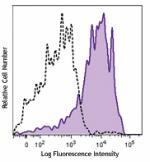
Human prostatic adenocarcinoma cell line, LNCaP, was stained... -
Purified anti-human PSMA (FOLH1)
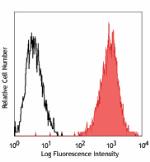
Human prostatic adenocarcinoma cell line LNCaP stained with ... -
PE anti-human PSMA (FOLH1)

Human prostatic adenocarcinoma cell line LNCaP stained with ... -
Alexa Fluor® 488 anti-human PSMA (FOLH1)
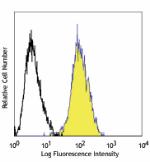
Human prostatic adenocarcinoma cell line LNCaP stained with ... -
APC anti-human PSMA (FOLH1)
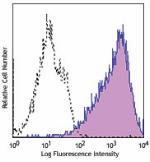
Human prostatic adenocarcinoma cell line LNCaP cells were st... -
Biotin anti-human PSMA (FOLH1)
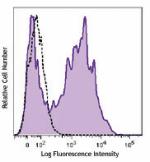
Human prostatic adenocarcinoma cell line, LNCaP, was stained... -
TotalSeq™-A1027 anti-human PSMA (FOLH1)
-
TotalSeq™-C1027 anti-human PSMA (FOLH1)
-
TotalSeq™-B1027 anti-human PSMA (FOLH1)
 Login / Register
Login / Register 




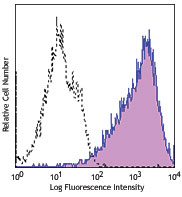
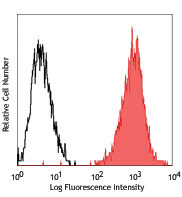
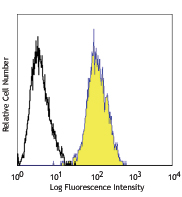
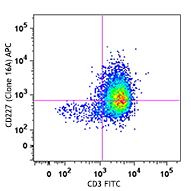



Follow Us